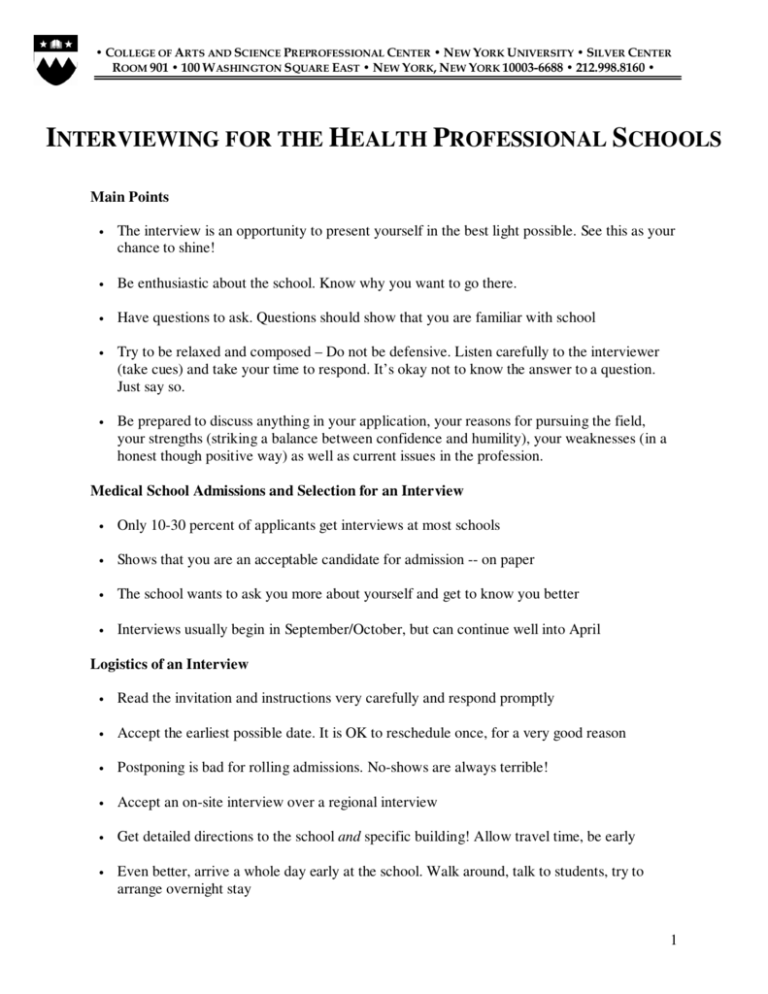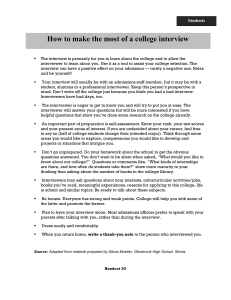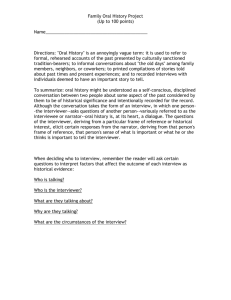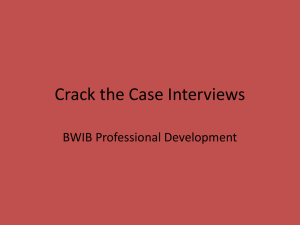interviewing for the health professional schools
advertisement

• COLLEGE OF ARTS AND SCIENCE PREPROFESSIONAL CENTER • NEW YORK UNIVERSITY • SILVER CENTER ROOM 901 • 100 W ASHINGTON S QUARE EAST • NEW YORK, NEW YORK 10003-6688 • 212.998.8160 • INTERVIEWING FOR THE HEALTH PROFESSIONAL SCHOOLS Main Points • The interview is an opportunity to present yourself in the best light possible. See this as your chance to shine! • Be enthusiastic about the school. Know why you want to go there. • Have questions to ask. Questions should show that you are familiar with school • • Try to be relaxed and composed – Do not be defensive. Listen carefully to the interviewer (take cues) and take your time to respond. It’s okay not to know the answer to a question. Just say so. Be prepared to discuss anything in your application, your reasons for pursuing the field, your strengths (striking a balance between confidence and humility), your weaknesses (in a honest though positive way) as well as current issues in the profession. Medical School Admissions and Selection for an Interview • Only 10-30 percent of applicants get interviews at most schools • Shows that you are an acceptable candidate for admission -- on paper • The school wants to ask you more about yourself and get to know you better • Interviews usually begin in September/October, but can continue well into April Logistics of an Interview • Read the invitation and instructions very carefully and respond promptly • Accept the earliest possible date. It is OK to reschedule once, for a very good reason • Postponing is bad for rolling admissions. No-shows are always terrible! • Accept an on-site interview over a regional interview • Get detailed directions to the school and specific building! Allow travel time, be early • Even better, arrive a whole day early at the school. Walk around, talk to students, try to arrange overnight stay 1 Format and Structure of an Interview • Often an info session and brief presentation on school, plus a tour and lunch, will precede or follow the interview • Who will interview you? Usually a faculty member (from either clinical or basic science), sometimes a dean or admissions person. • It is usually one-on-one; some schools use two interviewers at once. Panel interviews are rare. A few schools have two separate interviews; a medical student might conduct the second one. • How long will it take? The average is a half-hour; can vary greatly • The interview will either be blind (without your file), or with your file • May be asked tough, unreasonable, difficult questions to gauge your reaction 2 EXPECTATIONS OF THE INTERVIEWER AND ADMISSIONS COMMITTEE Goals of the Interview from Their Point of View • Get to know you as a person and as a potential student and physician • Obtain information that is independent of your file, or clarify/expand what’s on paper • Obtain your explanation/clarification of problems or “red flags” • Sell the school – and recruit you Most crucially, they will evaluate you on qualities necessary for success in medical school and in a medical career. For example: 1. Your motivation for/choice of medicine (“why do you want to be a doctor?”). If it’s “because I like science” or “because I want to help people,” provide concrete examples of how you’ve already demonstrated these personal qualities. (And beware of “I’ve always wanted to do it” and “my parents are doctors.”) 2. Your knowledge of what it means to be a medical student and doctor 3. Your knowledge of current issues in the medical field 4. Your interest in, and knowledge of, their school 5. Your weaknesses and how you honestly deal with them 6. Your strengths and how they can contribute to the profession 7. Your capacity for logical thought (may ask a hypothetical problem with no one answer) 8. Your ultimate goals 9. Your level of maturity and responsibility (your “professionalism”) 10. Your character, ethics, and personal judgment 11. Your sincerity and honesty 12. Your compassion for others, your commitment to service and altruism, and how you have demonstrated this (your “humanity”) 13. Your relational and interpersonal skills. Can you communicate and empathize with others? Can you treat patients with respect and sensitivity? (“Humanity” again) 14. Your capacity for both leadership and teamwork 15. Your ability to think “on your feet,” to be calm under pressure, to handle adversity and ambiguity in questioning 3 COMMON MEDICAL SCHOOL INTERVIEW QUESTIONS *Questions about your essay and AMCAS application are always fair game! Review them.* Questions about YOU: • Why do you want to be a doctor? Many variations may be asked: Why did you choose medicine? Why do you think you would make a good doctor? What is your motivation for going into this profession? How do you know medicine is the right career for you? • Tell me about yourself. • What are your strengths or weaknesses? • What is your greatest accomplishment? What are you most proud of? • Tell me about a mistake you made. • Why should we accept you over another applicant? What makes you stand out/different? How should I present you to the committee? • Why do you want to attend this school in particular? What do you know/like about us? Why go here and not elsewhere? Where else did you apply? • Who have your role models been? Or, Whom do you admire and why? • Have you had a mentor during your education? • What non-school books are you currently reading? • What do you like to do in your spare time? What are your outside interests? • What are you doing with your year off? • How do you handle stress/pressure? Questions about YOUR EXPERIENCE: • Tell me about your medical experience (usually hospital volunteering). • Tell me about your community service. • Tell me about this laboratory experience you had. • Tell me about this job you had. Questions about YOUR EDUCATION: • Why did you choose NYU? • Why and how did you choose your major? • What did you do/learn in class X? Or, what classes did you like/not like? 4 • Tell me about your research (lab, senior project…). • Do your grades/MCAT score truly reflect your ability in the sciences? • Are you satisfied with your academic performance? Why or why not? Questions about YOUR FAMILY: • Are other members of your family physicians? How has that influenced you? • Tell me about your family and your relations with them. • Do you want to have a family of your own? Questions about YOUR FUTURE: • What do you want to get out of your medical education? • What do you want to get out of your medical career? • What do you see yourself doing ten years from now? • What do you think a med student’s/physician’s life is like? • Are you considering a specialty? • What if you don’t get into med school? • How will you finance your education? Questions about the PROFESSION and the WIDER WORLD: • What are some issues/problems facing healthcare today? Or, what do you think about issue X? (Read up on: managed care, HMOs, Medicare, prescription benefits for the elderly, euthanasia & assisted suicide, abortion, genetic engineering and the human genome, cloning, animal research, stem cell research, malpractice suits, the uninsured, etc. Follow the news. For $19.50, you can buy a good booklet at www.admission-interview.com.) • How would you handle situation X as a physician? (Difficult ethical situations – stopping life support, an abortion for a minor, a patient who cannot pay you, etc.) • Your opinion on a current events issue or political debate “Do YOU have any questions?” • Always say yes! • This is your chance to ask about the school, curriculum, clinical instruction, etc. • Show your interest and that you know something specific or unique about the school. 5 PREPARING FOR THE INTERVIEW • You have the interview to paint a portrait of yourself. Decide ahead of time what you want the interviewer to know about you that may not be apparent from your paper file. • Know yourself. Be able to speak, briefly and to the point, about anything and everything on your application, résumé, and transcript. • Review your AMCAS application and personal statement. It is very embarrassing to be asked about something you wrote and not remember it. • Also know yourself in terms of strengths. What are your strong points, as a student, a person? What skills or abilities distinguish you from others? Make a list. • Think about these character/intellectual traits and skills. How can they help you in medicine? Can you give concrete examples of how you’ve used them to your advantage? • A slightly different approach is to think about what makes a good medical student and doctor, and see how many of those qualities or skills you already have. Find concrete ways in which you’ve demonstrated these strengths. • In addition, what are your weak points? Make a list. Be able to alleviate an interviewer’s concerns about weaknesses if s/he raises the issue. • Think about your decision to attend medical school. Be prepared to discuss your motives for doing so. • Do mock interviews at the Wasserman Center for Career Development and get videotaped, or at least practice in front of a mirror or with a friend, so you can get a sense of how you present yourself, appear, and sound to an interviewer. Practice common questions and answers. • Do your research! Know the school inside and out: what famous/important people are there? For what are they known? Are they building or expanding? Do they have a distinctive philosophy or curriculum? Are they doing cutting-edge research that deeply interests you? Read the school catalogue, website, view book. Schools differ just as individual applicants do! Also find out about your interviewer: her specialty, any books or articles, research interests, etc. • An interview is a two-way process. They are learning about you and you are learning about them. See what each school can offer you and if you will enjoy it. • Research also means keeping on top of the latest scientific and biomedical advances and controversies in the news (cloning, the human genome, abortion, funding for scientific research, HMOs & health care reform, animal rights, malpractice suits, liability insurance, cost containment, Medicare, prescriptions for the elderly, stem cell controversy, even euthanasia, etc.). If you’re asked a question on a controversial topic, you want to be able to give a reasoned and articulate answer, one that sees both sides of the issue but takes a stand. There is no right answer. Be ready to discuss ethical ramifications. To stay informed: newspapers; good news magazines; JAMA; New England Journal of Medicine; etc. 6 AT THE INTERVIEW ITSELF • Use a title and last name when greeting and thanking. Never use first names unless invited to do so!! • Be polite and respectful to anyone and everyone you have contact with, from receptionists up to deans and physicians. In a sense, everyone you have contact with is interviewing you! • Shake the interviewer’s hand firmly, but don’t break it! Wait to be offered a seat. If there is no offer, let the interviewer sit before you do. • Turn off cell phone. • Listen to the questions. What is the interviewer looking for? Some questions call for a factual response, some for an opinion. Don’t answer too quickly; pause and think before answering if necessary. Keep answers brief and don’t ramble. • Be aware of your interviewer’s reactions. Does s/he seem to want you to go on with more details? Or is s/he trying to move you to another topic? A nod or smile means keep going; looking down or shifting weight means move on. • Try to bond with the interviewer. Look around the room – are his/her interests apparent? • Good non-verbal behavior: make eye contact (shows confidence, openness, and engagement); open body position (no folded arms – try keeping hands in lap or on arms of chair); keep hand gestures to a minimum; good posture – sit up straight; smile; watch nervous gestures. No gum. • Good verbal behavior: don’t speak too quickly, speak up and articulate clearly, limit fillers (um, you know, like…) • Good appearance: dress should be professional, conservative, and simple – suits are best for both men and women. Limit jewelry and make-up, take out body piercings, no cologne or perfume. Fresh haircut and shave. • Exhibit a positive overall attitude. Project enthusiasm, confidence, and self-assurance. Be ready to talk about yourself without shyness. This is your chance to prove yourself in person. Showcase your accomplishments. Express yourself as unique, with something to offer. • Keep calm, control your emotions, stay composed. • You may be asked a question intended to throw you off balance, surprise you, shock you. Don’t get defensive. Medicine is a stressful profession, so show you can handle it. Some stressful questions may be intended to see how you can deal with it and think under pressure, not to elicit a specific or correct answer. Never be defensive. Don’t bluff responses or talk about things you know nothing about! You are better off admitting ignorance. • Always provide examples, to back up what you say about yourself and to make it meaningful. Be concrete and specific, especially when highlighting your strengths and accomplishments. Remember, if you say you want to be a doctor so you can help people, then you’d better have a track record of helping others. • Get the interviewer’s name, and card if possible, and send a thank-you note. 7








